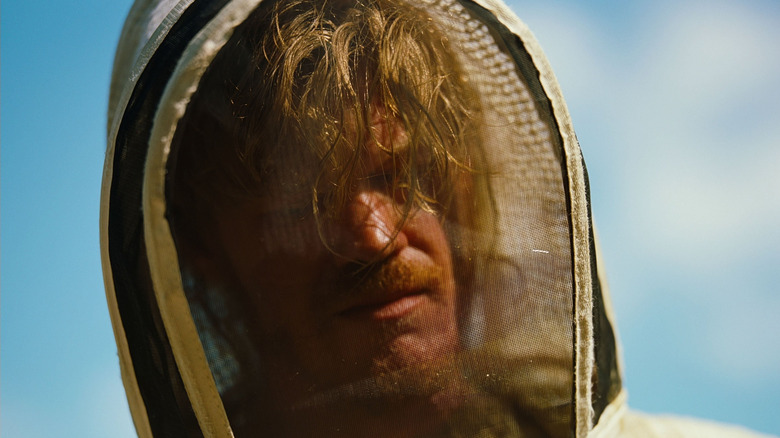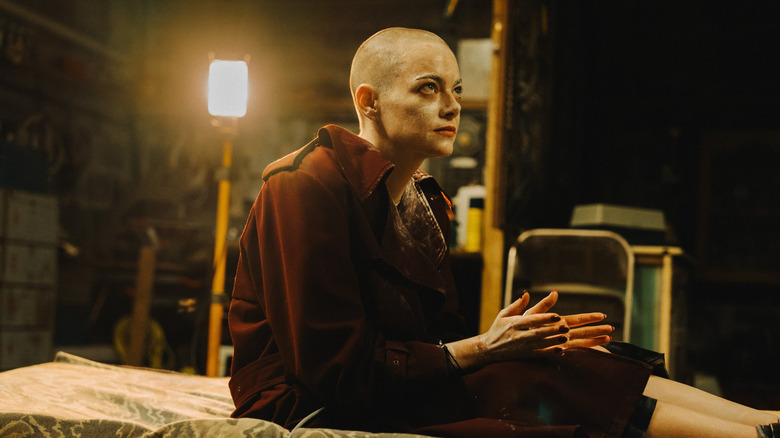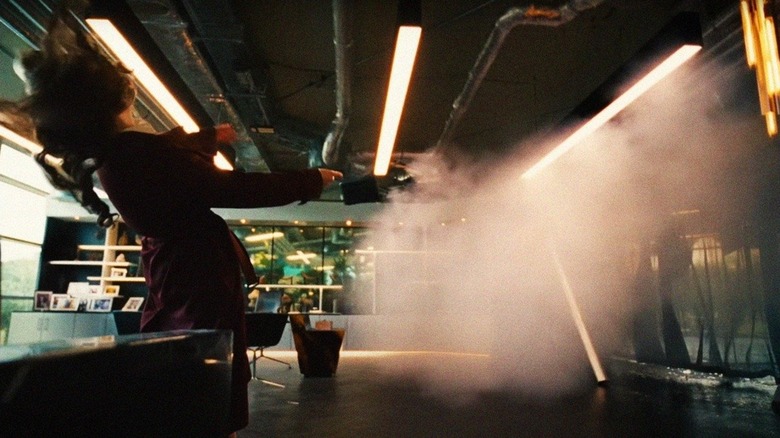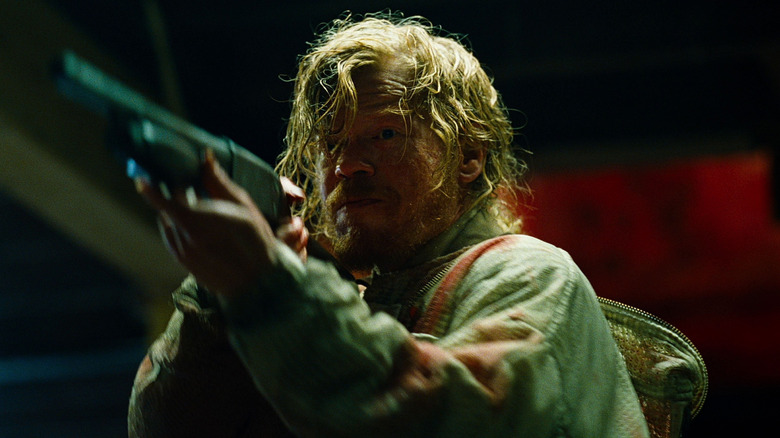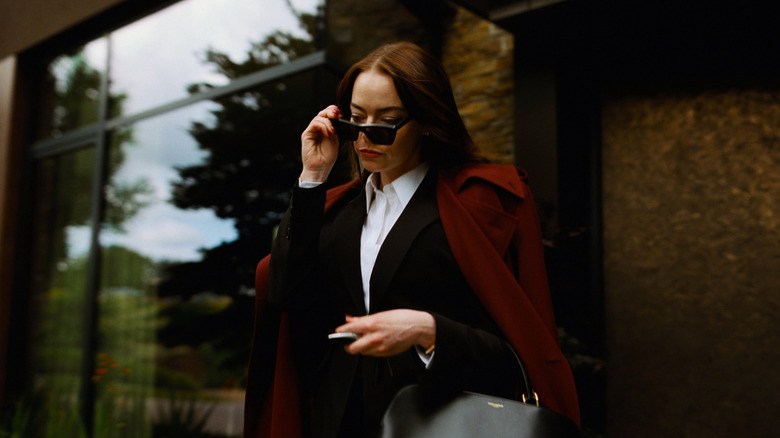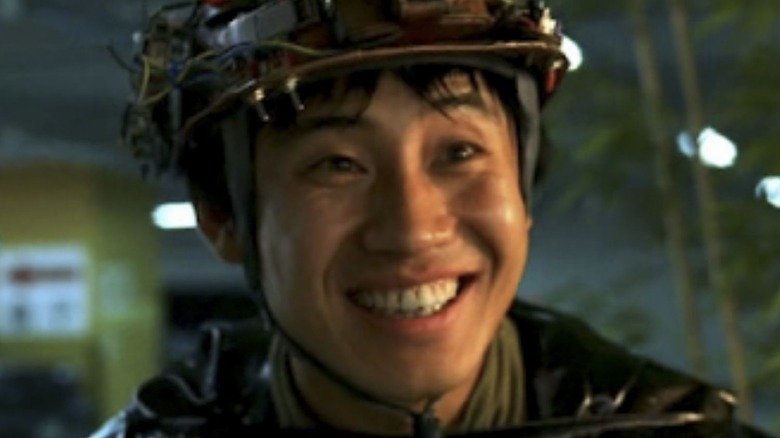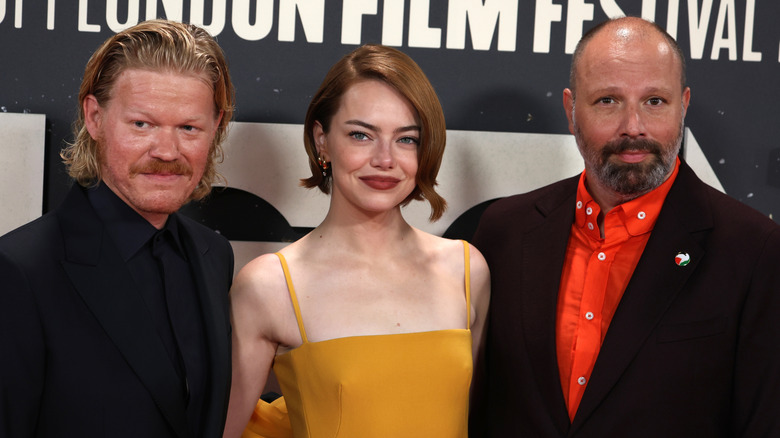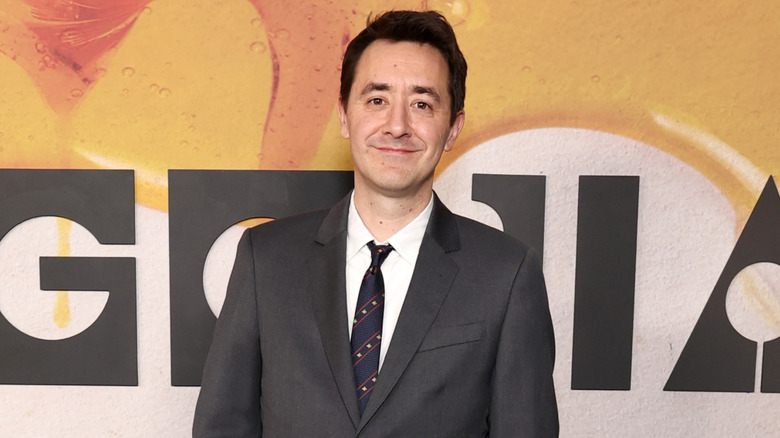Bugonia's Wild And Disturbing Ending Explained
Contains spoilers for "Bugonia"
The ending of "Bugonia," the latest provocation from "Poor Things" and "Kinds of Kindness" director Yorgos Lanthimos, isn't impossible to predict. The film's central question — whether or not healthcare company executive Michelle Fuller (Emma Stone) is an alien — could only possibly be answered one of two ways, and one answer is a lot juicier than the other. Looking up genre classifications for the movie could give away the answer. Since "Bugonia" is a remake of "Save the Green Planet!," Jang Joon-hwan's 2003 South Korean film that Looper ranked as the 15th best apocalyptic movie of all time, watching or reading about the original would also provide easy spoilers.
But even if you guessed right about the big mystery, seeing the reveal play out is still completely wild — and the final act's escalating violence building up to and following that reveal is no less disturbing despite the outlandishness. It's a lot to process, which is par for the course for a Yorgos Lanthimos film ("Poor Things" is the only time he ever did a happy ending, and that was still a lot to process). What does the ending of "Bugonia" mean, and how are we supposed to feel about it? This article seeks to make sense of the film's cosmic absurdity and bleak outlook on humanity.
What you need to remember about the plot of Bugonia
Teddy Gatz (Jesse Plemons) is a beekeeper and conspiracy theorist seeking to defend humanity from "Andromedan" alien invaders. He manipulates his autistic cousin Don (Aidan Delbis) to work with him on his new mission: Kidnapping Michelle Fuller, a pharmaceutical CEO he believes to be Andromedan. After the cousins apprehend Michelle, they shave her hair — believed to be how Andromedans communicate — and lock her in their basement.
Much of the movie consists of Teddy repeatedly trying to force Michelle to confess being an alien before her mothership arrives during a lunar eclipse. Dream sequences and conversations reveal the source of Teddy's rage: His mother Sandy (Alicia Silverstone) was left comatose by a drug test from Michelle's company Auxolith. Don is not permitted to speak to Michelle, lest he treat her with too much sympathy. Teddy subjects Michelle to electroshock torture, deeming her high pain tolerance proof she's Andromedan royal.
Teddy lets the "Queen" go upstairs for spaghetti dinner. Their argument over dinner turns into a physical fight, only to get interrupted when local cop Casey (Stavros Halkias) stops by to investigate. While Teddy talks to Casey, Don's now on guard duty keeping a shotgun pointed at Michelle in the basement. She tries to appeal to his conscience and his loneliness, offering to let him go to space if he turns Teddy in to the police. Feeling completely lost, Don aims the gun at his own head and shoots. Teddy kills Casey after hearing the gunshot.
If you or someone you know is struggling or in crisis, help is available. Call or text 988 or chat 988lifeline.org
What happened at the end of Bugonia?
Don's suicide and Casey's murder set the final act of "Bugonia" into a mode of heightened panic. Hoping to get him arrested and out of her sights, Michelle tells Teddy she's an alien and claims that a bag of antifreeze is secret Andromedan medicine that can wake his mom up from her coma. Teddy goes to the hospital to give his mom the "medicine," which kills her, but he avoids getting arrested.
Turns out Teddy's got experience evading the law: After breaking from her restraints, Michelle explores the basement to discover Teddy's "research" — which includes the corpses of several people he's killed before. When he returns, she asks how many of his victims were Andromedans, he answers, "Two." Michelle gives an involved speech on Andromedan history, saying she and the other aliens evolved humanity and want to help it become better. She agrees to take Teddy to her mothership the night of the eclipse, bringing him to her office where she types a password into a calculator to open up the teleportation device she says is in her closet. Teddy wears a suicide bomber vest meant as a weapon against the aliens, but while he's in the closet, it goes off by accident and he explodes.
Michelle is taken away in an ambulance, but as the eclipse commences, she leaps out and runs back to her office closet to teleport to the mothership, proving to actually be the Andromedan Queen. She decides the humanity isn't worth saving, popping a bubble over a flat model Earth to activate the species' extinction. Marlene Dietrich's version of "Where Have All the Flowers Gone?" plays over a montage of human corpses around the world (luckily, animals are still alive).
Does the ending justify Teddy's actions?
One of the most controversial aspects of "Bugonia" is how the ending proves the mentally unstable conspiracy theorist Teddy as having been right all along about his most out-there beliefs. Since he and Don are dead when the spaceship reveal occurs, you can't even interpret the conspiracy as just in their heads the way you can with the antifa super-soldiers in "Eddington." Does Michelle actually being the Andromedan who wipes out the human race make Teddy's prior torture of her justified as humanity's last stand against its alien oppressors?
The answer is no, because it's Michelle's experience with Teddy that leads her to cause the extinction to begin with. She wanted to help humanity overcome its violent nature, but Teddy was evidence of her species' failure to shape evolution for the better. Keep in mind, this was a man who killed multiple innocent people for the sake of "research." If Teddy hadn't brought a suicide bomber vest with him to the Auxolith office, maybe he could have made it to the mothership and become the hero he wanted to be, but instead, his own violent self-destruction caused the whole planet's demise.
Does the ending justify Michelle's actions?
So if Teddy's actions weren't justified, does that make Michelle's actions justified? The answer is still no — unless you're an extreme misanthropist who believes human extinction is a good thing. Still, it's surprising how sympathetic she ends up being: Even when she's making her final decision, its clear she doesn't take it lightly. If Michelle being an alien might seem too favorable to conspiracy theorists, her genuine desire to improve humanity before deeming it a lost cause might seem too forgiving a characterization of big business executives.
Having empathy for messed-up people on different sides of social divides, pulled by forces larger than either of them, may well be the point of both lead characters, however strange or controversial the political implications might seem. In his 9/10 review of "Bugonia" for Looper, Matthew Jackson explained how the film is "not just about captor and captive, but about two survivors simply trying to make it to the other side of whatever this strange situation actually is."
A good comparison for the shape of the morally grey conflict between Teddy and Michelle is that between Rorschach and Ozymandias in "Watchmen." Teddy and Rorschach are both delusional violent extremists who shouldn't be looked up to, but who happen to come across actual conspiracies and attain tragic pathos as they hold onto their convictions in the face of said conspiracies. Michelle and Ozymandias, meanwhile, are elitists with elaborate plans to save the world from its self-destruction, but are unfeeling towards those they deem beneath them and are both ultimately willing to commit mass slaughter in the name of a supposed greater good. "Bugonia," however, gets even bleaker than "Watchmen" — where Ozymandias delays the apocalypse, but Michelle hastens it.
Is the ending a joke?
It's complicated enough to decide what to think about the ending of "Bugonia," but what might really leave viewers questioning themselves is how to feel about it. "Bugonia" is at least theoretically a comedy, and the reveal of Michelle's true Andromedan nature is so absurd it gets laughs. The moment of her fateful decision still has humor to it, with the wacky hair costumes and that bubble, but Emma Stone's acting still gives the moment some earnest sadness.
Then there's the corpse montage, which feels so chilling that it seems hard to walk out of the theater laughing. If it's meant as a punchline, it's an undeniably depressing one. The song choice of "Where Have All the Flowers Gone?" seems sincerely sad, but depending on how cruel you see the ending as, perhaps you could interpret its usage as a parody of sincerity. How one feels about the ending of "Bugonia" — whether it's a nightmare or a joke — depends on whether you interpret the ending as mourning humanity or mocking it. If you determine the latter, its effectiveness then depends on how you feel about said mockery. Arguments can be made any number of ways, and the ending is sure to evoke a mix of emotions.
Mixed emotions are Yorgos Lanthimos' goal — and in a Q&A session following an early screening at the Alamo Drafthouse in Brooklyn, NY, Jesse Plemons revealed the cast's universally positive reaction to the final needle drop "almost turned Yorgos off" from using it. "Everybody loved it so much, I thought 'Maybe it's the wrong song,'" the director confirmed.
How does the original film's ending compare?
In adapting a Korean satire to the context of 2020s America, "Bugonia" makes several changes from "Save the Green Planet!" These include swapping several characters' genders and bringing contemporary discourses around the effects of social media echo chambers. The big twist, however, is the same: The abducted CEO believed to be an alien by the conspiracy nut turns out to be, in fact, an alien, who declares Earth a failed experiment and decides to end all human life.
The tone of "Save the Green Planet!" is more broadly comedic than that of Yorgos Lanthimos' remake, and the differing tones lead to different sorts of apocalypses. At the end of the original movie, the whole Earth blows up as if it were the Death Star at the end of "Star Wars." That's a very different sort of image than the dead bodies that conclude "Bugonia" — though while the "Bugonia" apocalypse is more cinematically horrifying, it does offer hope for non-human life on Earth than "Save the Green Planet!" definitively does not.
The cast and crew say the ending rewards rewatches
Once they know how "Bugonia" ends, viewers who aren't too traumatized by what they just experienced may very well crave a second watch to catch clues they missed the first time. In an interview with Gizmodo, Yorgos Lanthimos and screenwriter Will Tracy acknowledged such clues are around, while also claiming that building to a twist ending wasn't their primary focus. "I think there are a few moments in there that reward people who are interested in going back and seeing [it again]," said Tracy, while also saying, "I hope that at least, the film is not just a sort of toy that's engineered to do that [ending]."
Lanthimos explained that the film's layered rewatchability is mainly due to the actors' performances, while his visual approach was to "just play it straight basically." He elaborated, saying, "on a second viewing, maybe you do see more or you do notice the performances more when you have more information, and you realize, 'Oh, that's why she blinked that moment,' which you couldn't have noticed on the first viewing. ... It's actually one of my films that I've been able to view easier during post-production again and again."
Since Emma Stone's character is the center of the big twist, it makes sense she was most concerned with this issue. She said at an Alamo Drafthouse Q&A, "A big part of what I was thinking about was actually people watching this film for the second time and how that would all work together, and if it would make sense." She mentioned a "hinty eye thing" that she described as a "tiny tell" of Michelle's true nature.
The screenwriter explains how politics impacted the ambiguous ending
Will Tracy understands his script for "Bugonia" will leave audiences confused as to how to feel. In an interview with Inverse about the film's ending, he embraced the ambiguity, saying "Maybe [audiences] can come to a few different conclusions [about the ending]... It has a different kind of ambiguity baked into it in terms of whether you think it is a fitting, or an unjust, or just ending, or happy ending, or sad ending."
The very idea this ending could be deemed "happy" speaks to the sheer level of hopelessness out there in the current political climate. Many films this year have touched on some aspect of the moment's anxieties. "A House of Dynamite" imagines a potential World War III scenario, as does Spain's official Oscar submission "Sirāt." "Eddington" looked back on 2020 as the year that America seemingly lost its mind. Dystopian satires like "One Battle After Another" and "Mickey 17" end up feeling somehow more hopeful than the news in an increasingly dystopian reality. In some ways, "Bugonia" is the year's most brutal political film yet.
Tracy considers it likely that the bleak nature of today's political situation will make the ending hit even harder for audiences than the similar ending of "Save the Green Planet!" did 22 years ago. He considered this question, saying, "Probably as time has gone on and the climate catastrophe has felt increasingly urgent, and for some people hopeless, that that feeling of our relation to the planet and our trying to prefigure what the planet might look like without us and what our role is on this planet, I think all those questions feel much more top of mind ... The ending feels a bit more reactive around that."
